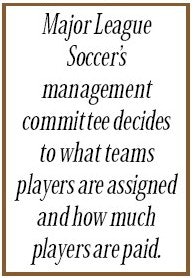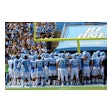
Currently in its fifth season, Major League Soccer has built a relatively small but loyal following, attracting about 14,000 fans per game. Part of what sets MLS apart from its long-defunct predecessor, the North American Soccer League (NASL), is its single-entity structure, in which all of the league's teams are owned by the league.
Governed by a management committee comprised of the owners/investors within the league (all 12 team operators in addition to "passive investors" who simply provide capital and share in profits or losses), the league grants the committee unconditional power. It decides to what teams players are assigned and how much players are paid. While teams are able to propose trades, all trades still must be approved by a twothirds majority of this body.
While league management may see the single-entity structure as a great method for making the league profitable, MLS players do not view the structure in the same light. Since the league controls all player assignments and restricts bidding on contract terms to one team, the players believe that the league restricts fair and open competition for the players' services. The players have no union, and thus have no collective bargaining agreement with the league-and no leverage with which to demand changes to the league structure.
That remains the case after the dismissal, this spring, of a class-action lawsuit that the players had hoped would force MLS to mimic the structure of the more-established NFL, NBA, NHL and MLB-whose players enjoy free agency and the ability to negotiate (often multimillion-dollar) contracts in an open-market system. The ramifications of the MLS players' loss could extend far beyond the parameters of professional soccer in the United States.
In 1997, eight players filed suit on behalf of all MLS players, charging the league with violating antitrust statutes. In Fraser et al. v. Major League Soccer et al. (United States District Court, District of Massachusetts, Civil Action No. 97-10342-GAO), the players argued that despite the official economic organization of the league, the MLS is, in practice, a "regular" league like the NFL, NBA and so on, and should be subject to the same regulations. The players claimed that although the league may be designed as a single entity, all of the teams in the league symbolize different economic actors, and that they had collaborated unreasonably to restrain trade by keeping players' salaries down.
In all, the lawsuit charged the league with five specific violations, three relatively minor counts and two large ones-Section 1 of the Sherman Anti-Trust Act and Section 7 of the Clayton Act.
The two acts are very closely related, in that they are designed to prevent economic combinations that will lead to monopoly or unfair advantage for one corporation in the marketplace. The Sherman Act states that "every contract, combination in the form of trust or otherwise, or conspiracy in restraint of trade or commerce among the several states or foreign nations is declared to be illegal." The Clayton Act forbids mergers or acquisitions that "may substantially lessen competition or tend to create a monopoly."
The league motioned for a summary judgment to dismiss the two counts dealing with the antitrust statutes because, the league argued, as a single economic entity it cannot be in violation of antitrust statutes. The plaintiffs, meanwhile, moved for a summary judgment against the league's use of the "single-entity defense."
The district court judge, George A. O'Toole, decided in favor of the defendants and dismissed the antitrust charges against the league. (A trial date for Counts II, III and V has been set for next month.) limit to the Sherman Act, in that it does not prohibit single economic entities from acting unilaterally in ways that can decrease competition. The act only forbids activity by multiple economic actors that unreasonably restrains competition.
The players therefore argued that the league was not a single body but was actually comprised of different teams. If the team operators, who are all members of the management committee, were found to be separate economic actors, the strength of the players' case would have increased dramatically, because the defendants could legitimately be tried for violating antitrust statutes.
As far as O'Toole was concerned, however, MLS is legally considered a "single entity," and thus cannot be found in violation of the Sherman Act.
Even though the teams play a competitive season on the field, by definition of the law they are not competitors but rather partners within a corporation. Nor could MLS, which was formed in 1995 as a limited liability company (for legal purposes, a corporation), be found in violation of the Clayton Act, which explicitly states that a merger or acquisition must have taken place.
MLS was created as an entirely new economic entity, and was not merged with or acquired by another corporation. A key argument of the players, that the league was decreasing competition for players' salaries in the market, failed because MLS entered a nonexistent market. Without an existing Division 1 professional soccer league in the United States, the league could not be seen to decrease competition in the market by its entry.
For a fledgling league such as MLS, the single-entity structure makes a great deal of sense, because it allows the league to control costs while maximizing revenues. If the Fraser decision is upheld on appeal, this is a verdict that could affect a number of new or planned professional sports leagues, including the WNBA, the WUSA (the new women's soccer league), XFL (the World Wrestling Federation's new football league), a proposed women's ice hockey league and the new NBA "minor league."
With the aid of legal precedent, these leagues can all establish themselves as single-entity structures, maximizing profits by eliminating the salary escalation that comes with bargaining competition for players.
The decision should be particularly important to leagues starting up in cases where there is no established professional league-for example, women's sports. As these sports gain credibility on the professional level, participation on the youth level should increase at the same rate. Their success could eventually lead to a decline in popularity of the "big four" sports.
For soccer specifically, the Fraser decision definitely improves the prospects for the league and can only help the development of youth soccer.
































